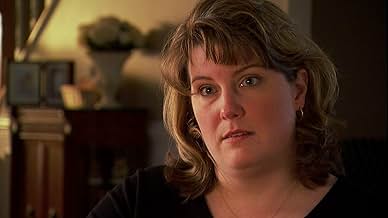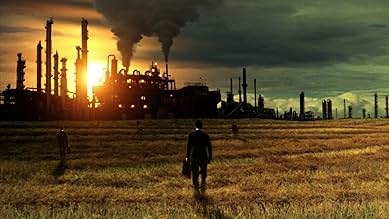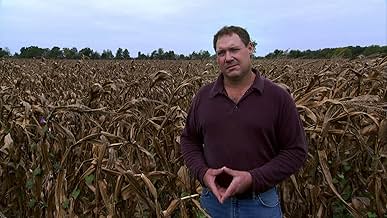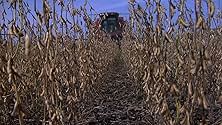IMDb-BEWERTUNG
7,8/10
52.902
IHRE BEWERTUNG
Ein wenig schmeichelhafter Blick in Amerikas konzerngesteuerte Lebensmittelindustrie.Ein wenig schmeichelhafter Blick in Amerikas konzerngesteuerte Lebensmittelindustrie.Ein wenig schmeichelhafter Blick in Amerikas konzerngesteuerte Lebensmittelindustrie.
- Regie
- Drehbuch
- Hauptbesetzung
- Für 1 Oscar nominiert
- 7 Gewinne & 20 Nominierungen insgesamt
Empfohlene Bewertungen
This documentary does a good job educating the consumers on how food is produced,packed and marketed in U.S nowadays. By going back repeatedly to how it was before it shows us how much it has evolved and also the effects of those drastic changes on food prices, American eating habits and ultimately on their health. The movie does all that without ever going over the top or becoming apocalyptic, which seems to be a trend for these type of movies nowadays,it does call out the greedy mega food corporation and the state officials for not arming the regulatory agencies better but the consumers are also at fault here for not informing themselves enough on the content of the products in order to choose what's best for their health not just for their wallet.
Food, Inc is essential viewing even though it's not a great movie. Much like An Inconvenient Truth its facts and accumulation of information trumps style or overall craft. This doesn't mean that the director isn't making a bad film or doesn't have some clever visual cues and transitions or know how to combine interviews and archival footage, since he does. But it's the precious interviews he gets, and just leaving the theater knowing that American food (or just stretching worldwide) is run by four corporations and that the farming industry as is advertised as "the American Farmer" is in deep trouble.
It's separated into sections, and each one has something interesting. The one that got to me personally was the section on chickens, how they, like cows as well, are genetically engineered to get bigger a lot faster than they used to, and how the working conditions are at best hazardous and at worst untenable. We see one woman interviewed, the only one who bucked her corporate bosses, to let the cameras in to the state of the chicken coop. Even if one hasn't seen a regular chicken coop before, the state of this place, the stark and dark mis-en-scene, gives us a picture of how it is. As someone like myself who likes a good piece of chicken every now and again, it made me about as guilty as imaginable.
But perhaps that's part of the point of Food, Inc - get us informed to the point where we're scared s***less. The downside may be the reach; while Inconvenient Truth had the boost of a Vice President, the big names in this documentary are authors, one of which wrote Fast Food Nation (and, surprisingly, eats a hamburger on camera, from a diner of course, and speaks about how burger and fries are some of his favorite food to eat despite the horrors of the fast food industry). So it's difficult to say how many people will see this who don't already have some idea about the atrocious conditions in slaughterhouses, the outbreaks of E-Coli that affect countless people including little Kevin as seen in the film, and Monsanto's patent of a soybean seed that they genetically altered. Between that last part alone and a little factoid made about Supreme Court justice Clarence Thomas, it's no wonder one leaves the theater flabbergasted.
There is some hope the film provides, however. A Virginia farmer, who treats all of his livestock with care and feeds them right (not copious amounts of CORN, which, by the way, is practically coming out of your ears as you read this), gives a few moments to reflect on how the ideal of the American farmer, of what they can give to the community and how they can try and be reasonable with having to do the inevitable of killing living things for food. Hell, the director even has Wal-Mart's one really good moment in the documentary sun in years with its endorsement of organic products. But whatever you're own persuasion on food- be you a hardcore vegan or someone just coming from McDonalds before the movie starts- Food, Inc can make some sort of difference, if only for the information. I know I may not stop eating certain foods, but I'll never forget to give another look or a double take on what's in it- or what may not be there at all. This movie is good, valuable stuff.
It's separated into sections, and each one has something interesting. The one that got to me personally was the section on chickens, how they, like cows as well, are genetically engineered to get bigger a lot faster than they used to, and how the working conditions are at best hazardous and at worst untenable. We see one woman interviewed, the only one who bucked her corporate bosses, to let the cameras in to the state of the chicken coop. Even if one hasn't seen a regular chicken coop before, the state of this place, the stark and dark mis-en-scene, gives us a picture of how it is. As someone like myself who likes a good piece of chicken every now and again, it made me about as guilty as imaginable.
But perhaps that's part of the point of Food, Inc - get us informed to the point where we're scared s***less. The downside may be the reach; while Inconvenient Truth had the boost of a Vice President, the big names in this documentary are authors, one of which wrote Fast Food Nation (and, surprisingly, eats a hamburger on camera, from a diner of course, and speaks about how burger and fries are some of his favorite food to eat despite the horrors of the fast food industry). So it's difficult to say how many people will see this who don't already have some idea about the atrocious conditions in slaughterhouses, the outbreaks of E-Coli that affect countless people including little Kevin as seen in the film, and Monsanto's patent of a soybean seed that they genetically altered. Between that last part alone and a little factoid made about Supreme Court justice Clarence Thomas, it's no wonder one leaves the theater flabbergasted.
There is some hope the film provides, however. A Virginia farmer, who treats all of his livestock with care and feeds them right (not copious amounts of CORN, which, by the way, is practically coming out of your ears as you read this), gives a few moments to reflect on how the ideal of the American farmer, of what they can give to the community and how they can try and be reasonable with having to do the inevitable of killing living things for food. Hell, the director even has Wal-Mart's one really good moment in the documentary sun in years with its endorsement of organic products. But whatever you're own persuasion on food- be you a hardcore vegan or someone just coming from McDonalds before the movie starts- Food, Inc can make some sort of difference, if only for the information. I know I may not stop eating certain foods, but I'll never forget to give another look or a double take on what's in it- or what may not be there at all. This movie is good, valuable stuff.
With family run farms pretty much a thing of the past, institutional farming has pretty much taken over,and the dim,dark & dismal effects are omnipresent. There is an epidemic of food borne illness,due to cattle being exposed to over use of steroids to make them grow fatter, faster (and this also includes chickens,pigs,etc.),not to mention GMO corn,grains,etc. Robert Kenner's eye opening film, 'Food,Inc.' manages to shine at least some light on some pretty unethical practices that are being undertaken by corporate owned & managed farms. The likes of Eric Schlosser (author of 'Fast Food Nation',which was made into a semi fictional film a few years back)is featured in interviews,along with Michael Pollan. Many fingers are pointed at guilty parties doing the dirty deeds of the farming industry,along with some pretty unpleasant footage of unethical practices (i.e. abuse of farm animals, although this film doesn't take up any kind of vegetarian/vegan agenda of it's own---the viewer can make up their own mind just what they prefer to eat). Much to my surprise,there is little discussion of the mad cow disease epidemic (or,BSE)from a few years back (only a passing reference). Rated PG by the MPAA,this film contains some unpleasant footage of animal abuse,as well as a rude word,or two. Okay for older children who care about what's on their plate for breakfast,lunch or dinner.
The message of 'Food, Inc.' is that most of what Americans now eat is produced by a handful of highly centralized mega-businesses,and that this situation is detrimental to health, environment, even our very humanity. The ugly facts of animal mistreatment, food contamination, and government collusion are covered up by a secretive industry that wouldn't talk to the filmmakers or let the interiors of their chicken farms, cattle ranches, slaughterhouses, and meatpacking plants be filmed.
Informed by the voices and outlook of bestseller authors Eric Schlosser ('Fast Food Nation') and Michael Pollen ('The Omnivore's Dilemma'), this new film is an exposé that offers some hope that things can be made better through grassroots efforts. True, Kenner points out, Monsanto, Smithfield, Perdue, et al. are rich and powerful. But so were the tobacco companies, and if Philip Morris and Reynolds could be fought successfully, so can the food industry. The fact that the vast Walmart is switching to organic foods because customers want them shows people vote effectively with their pocketbooks every time they buy a meal.
Other documentaries have covered this ground before. The 2008 French documentary 'The World According to Monsanto' (2008) focused on how that company, with government support, monopolizes seed planting, and Deborah Koons' 2004 'The Future of Food' went over similar ground. Jennifer Abbott and Mark Achbar's sweeping 2003 film 'The Corporation' (2003) touched on Monsanto's monopoly too. In more general terms, the ominous, narration-free German documentary 'Our Daily Bread' (Nikolaus Geyrhalter, 2003) delivered 'Food, Inc.'s' message about dehumanized factory-style food production with a European focus. Richard Linklater's 2006 'Fast Food Nation' grew out of Schlosser's book about how bad and disgusting American fast food is and how it undermines the health. These are all good films, and there are and will be lots more. As this new film mentions, exploitation and malpractice in the meat industry were exposed as far back as Upton Sinclair's 1906 muckraking book, 'The Jungle.'
'Food, Inc.' is a populist and practical film that speaks with the voices of farmers, advocates, and journalists, and focuses on food, what's wrong with it, and what we can do about it. Kenner offers lots of practical information and appeals to everyday people. The film goes back to the Fifties to show how the rise of fast food contributed to centralized, less diverse American food production. MacDonald's now much of the chicken, beef, potatoes, and many other foods produced in the country. The film explains that only a handful of companies control not only most of the beef, pork, chicken, and corn produced in the US but most other food products as well. Moreover not only is corn the major feed given to food animals, but a surprising amount of the tens of thousands of products sold at today's supermarket -- that packaged junk racked in the center of the store that Atkins and now Pollen have told us to avoid, are also derived from corn. Because of the way certain food products have government support, hamburgers are cheaper than fresh vegetables. Kenner focuses on a low-income Orozcos who both work and feel forced to rely on fast food meals because they fill them and their kids more economically than fresh produce bought at the market.
The new industry has developed chickens that grow bigger faster with more breast meat. They're kept in closed dark pens. The story is the same for all these poor mass produced critters, crammed together in great numbers, filled with antibiotics, deformed, suffering, ankle deep in their own excrement, brutally killed. The film has good footage of the big southern meat producer, Smithfield, showing how the new mega-food industry feeds off of exploited low-wage illegal immigrants who it treats as expendable, just like the animals.
An important spokesman in 'Food, Inc.' is an organic farmer (you could just say a stubbornly old-fashioned one) called Joel Salatin of Polyface Farm in Swoope, Virginia, who's also an author, though the movie doesn't mention his books. His cattle are grass-fed and watching them, we realize that's the way nature meant them to be. They roams free, living a healthy life, trimming back the grass while fertilizing it so it will grow back. Cattle weren't meant to live on corn, and doing so has led to infection. The industry solution to such problems is not to change back to earlier methods, but to add more chemicals. They're doing crazy things like adding bleach to hamburger filler to keep the burgers from being poison.
It's hard to keep a balance in such a documentary but Kenner tries. That Hispanic family is important. Slow food and organics have been a thing of the rich, as their dilemma illustrates. There could be more focus on everyday people and their difficult daily choices. The Walmart story is important too: Walmart customers are everyday people. It's easy enough for well heeled families to buy boutique produce at farmer's markets. Average Joes don't always have the time or the money for that. Also important is Barbara Kowalcyk, who works in Washington with her mother as an advocate for stricter laws. Her 2 1/2-year-old son Kevin died in 12 days from a virulent form of E. coli after eating a hamburger on vacation. She wants not sympathy but control of an indifferent industry. Carole Morison is another vivid voice: she is a southern chicken farmer who lost her contract with Perdue for refusing to switch to dark enclosed tunnel chicken coops, the latest in a series of enforced "improvements" that lead to more production at the cost of more cruelty. She also explains how the farmers in thrall to these big companies are kept in debt like indentured servants.
Armed with witty, clear graphics and ironically bright color, 'Food, Inc.' has a chance of gaining more converts to "slow," organic, local food and opponents to crooked food regulation and monopolistic industry. This seems one of the most balanced and humane treatments of the subject yet.
Informed by the voices and outlook of bestseller authors Eric Schlosser ('Fast Food Nation') and Michael Pollen ('The Omnivore's Dilemma'), this new film is an exposé that offers some hope that things can be made better through grassroots efforts. True, Kenner points out, Monsanto, Smithfield, Perdue, et al. are rich and powerful. But so were the tobacco companies, and if Philip Morris and Reynolds could be fought successfully, so can the food industry. The fact that the vast Walmart is switching to organic foods because customers want them shows people vote effectively with their pocketbooks every time they buy a meal.
Other documentaries have covered this ground before. The 2008 French documentary 'The World According to Monsanto' (2008) focused on how that company, with government support, monopolizes seed planting, and Deborah Koons' 2004 'The Future of Food' went over similar ground. Jennifer Abbott and Mark Achbar's sweeping 2003 film 'The Corporation' (2003) touched on Monsanto's monopoly too. In more general terms, the ominous, narration-free German documentary 'Our Daily Bread' (Nikolaus Geyrhalter, 2003) delivered 'Food, Inc.'s' message about dehumanized factory-style food production with a European focus. Richard Linklater's 2006 'Fast Food Nation' grew out of Schlosser's book about how bad and disgusting American fast food is and how it undermines the health. These are all good films, and there are and will be lots more. As this new film mentions, exploitation and malpractice in the meat industry were exposed as far back as Upton Sinclair's 1906 muckraking book, 'The Jungle.'
'Food, Inc.' is a populist and practical film that speaks with the voices of farmers, advocates, and journalists, and focuses on food, what's wrong with it, and what we can do about it. Kenner offers lots of practical information and appeals to everyday people. The film goes back to the Fifties to show how the rise of fast food contributed to centralized, less diverse American food production. MacDonald's now much of the chicken, beef, potatoes, and many other foods produced in the country. The film explains that only a handful of companies control not only most of the beef, pork, chicken, and corn produced in the US but most other food products as well. Moreover not only is corn the major feed given to food animals, but a surprising amount of the tens of thousands of products sold at today's supermarket -- that packaged junk racked in the center of the store that Atkins and now Pollen have told us to avoid, are also derived from corn. Because of the way certain food products have government support, hamburgers are cheaper than fresh vegetables. Kenner focuses on a low-income Orozcos who both work and feel forced to rely on fast food meals because they fill them and their kids more economically than fresh produce bought at the market.
The new industry has developed chickens that grow bigger faster with more breast meat. They're kept in closed dark pens. The story is the same for all these poor mass produced critters, crammed together in great numbers, filled with antibiotics, deformed, suffering, ankle deep in their own excrement, brutally killed. The film has good footage of the big southern meat producer, Smithfield, showing how the new mega-food industry feeds off of exploited low-wage illegal immigrants who it treats as expendable, just like the animals.
An important spokesman in 'Food, Inc.' is an organic farmer (you could just say a stubbornly old-fashioned one) called Joel Salatin of Polyface Farm in Swoope, Virginia, who's also an author, though the movie doesn't mention his books. His cattle are grass-fed and watching them, we realize that's the way nature meant them to be. They roams free, living a healthy life, trimming back the grass while fertilizing it so it will grow back. Cattle weren't meant to live on corn, and doing so has led to infection. The industry solution to such problems is not to change back to earlier methods, but to add more chemicals. They're doing crazy things like adding bleach to hamburger filler to keep the burgers from being poison.
It's hard to keep a balance in such a documentary but Kenner tries. That Hispanic family is important. Slow food and organics have been a thing of the rich, as their dilemma illustrates. There could be more focus on everyday people and their difficult daily choices. The Walmart story is important too: Walmart customers are everyday people. It's easy enough for well heeled families to buy boutique produce at farmer's markets. Average Joes don't always have the time or the money for that. Also important is Barbara Kowalcyk, who works in Washington with her mother as an advocate for stricter laws. Her 2 1/2-year-old son Kevin died in 12 days from a virulent form of E. coli after eating a hamburger on vacation. She wants not sympathy but control of an indifferent industry. Carole Morison is another vivid voice: she is a southern chicken farmer who lost her contract with Perdue for refusing to switch to dark enclosed tunnel chicken coops, the latest in a series of enforced "improvements" that lead to more production at the cost of more cruelty. She also explains how the farmers in thrall to these big companies are kept in debt like indentured servants.
Armed with witty, clear graphics and ironically bright color, 'Food, Inc.' has a chance of gaining more converts to "slow," organic, local food and opponents to crooked food regulation and monopolistic industry. This seems one of the most balanced and humane treatments of the subject yet.
It is said that if you like eating sausage, you better not see how it is made. If you like eating meat, don't watch an animal being killed. If you have your fill of fruits and vegetables daily, don't think about the pesticides that coat them.
Our modern society has sanitized the presentation of food so that we can blissfully ignore what we should be concerned with: where food comes from, how it is raised, picked, handled, altered, transported and sold. Instead our attention is focused only on the awesome number of beautiful packages on market shelves, the unblemished fruits and vegetables available year round. In our increasingly artificial world appearance trumps taste, price trumps provenance, and industrialization gives us a false sense of safety.
It is therefore opportune to have the release of "Food, Inc". After you see it, you'll probably not shop for food in the same way. You may even change the kinds of food you eat. Not enough to convince me to become a vegetarian, but the ubiquitousness of corn and its derivatives, stated multiple times in the film, has made scouring of package labels a routine. The easy rule of not buying anything that contains more than five ingredients more frequently obeyed.
The film contains material that has already been brought out by others, for examples, (1) the problem of genetically modified seeds crossing into properties that do not want them and (2) the appalling conditions in which farm animals are kept. Some material is stressed too much, for example, the whole issue surrounding the tragic death of a kid from a very virulent form of E.coli and the attempts to establish regulations that might prevent such deaths. Individual cases are worth mentioning, but systemic and widespread issues are more compelling. The death of one is no doubt a tragedy but the impairment of thousands is of greater social consequence.
The issue of food regulation in general is a subject that I would have liked to see more of. The adverse effect of more regulation (as per the example above) can be too much regulation. The subject is briefly broached by the "good farmer" (Joel Salatin) who kills his chickens in the open. Ironically those chickens are likely to be more healthy and tasty. Regulation may eliminate this practice. Regulation can therefore have a negative impact on food culture. One of the best example of this is preventing the importation into the US of many delicious young unpasteurized cheese from Europe or even the marketing of such cheese by US producers. How many get sick from those cheese compared to the number of sick from peanut butter or spinach?
The film unwittingly projects a bit of naiveté in a couple of places. The segment about an individual being sued by a food conglomerate and essentially losing for lack of money is not news. This is a capitalist system: more money, better lawyers, almost certain victory. Yet the point is well taken that the food conglomerates are behaving in thuggish ways and acting with the protection of a complicit government (the best money can buy). But again, uncontrolled capitalism generates monopolies and they will fight tooth and nail to retain control and squash any semblance of competition. It's the logic of the beast. This not limited to food. Since voting habits have brought the US to this state of affairs, our only recourse as consumers is to eat bananas, and only bananas, for breakfast, lunch and dinner. It's called the Chiquita Diet.
In any case, this is a must-see documentary. The director is to be commended for having the courage of tackling this very important topic.
Don't forget to buy a five gallon basket of popcorn dripping with oleo and a big soda with plenty of high fructose corn syrup before going into the screening room. It may be the last time you do.
Our modern society has sanitized the presentation of food so that we can blissfully ignore what we should be concerned with: where food comes from, how it is raised, picked, handled, altered, transported and sold. Instead our attention is focused only on the awesome number of beautiful packages on market shelves, the unblemished fruits and vegetables available year round. In our increasingly artificial world appearance trumps taste, price trumps provenance, and industrialization gives us a false sense of safety.
It is therefore opportune to have the release of "Food, Inc". After you see it, you'll probably not shop for food in the same way. You may even change the kinds of food you eat. Not enough to convince me to become a vegetarian, but the ubiquitousness of corn and its derivatives, stated multiple times in the film, has made scouring of package labels a routine. The easy rule of not buying anything that contains more than five ingredients more frequently obeyed.
The film contains material that has already been brought out by others, for examples, (1) the problem of genetically modified seeds crossing into properties that do not want them and (2) the appalling conditions in which farm animals are kept. Some material is stressed too much, for example, the whole issue surrounding the tragic death of a kid from a very virulent form of E.coli and the attempts to establish regulations that might prevent such deaths. Individual cases are worth mentioning, but systemic and widespread issues are more compelling. The death of one is no doubt a tragedy but the impairment of thousands is of greater social consequence.
The issue of food regulation in general is a subject that I would have liked to see more of. The adverse effect of more regulation (as per the example above) can be too much regulation. The subject is briefly broached by the "good farmer" (Joel Salatin) who kills his chickens in the open. Ironically those chickens are likely to be more healthy and tasty. Regulation may eliminate this practice. Regulation can therefore have a negative impact on food culture. One of the best example of this is preventing the importation into the US of many delicious young unpasteurized cheese from Europe or even the marketing of such cheese by US producers. How many get sick from those cheese compared to the number of sick from peanut butter or spinach?
The film unwittingly projects a bit of naiveté in a couple of places. The segment about an individual being sued by a food conglomerate and essentially losing for lack of money is not news. This is a capitalist system: more money, better lawyers, almost certain victory. Yet the point is well taken that the food conglomerates are behaving in thuggish ways and acting with the protection of a complicit government (the best money can buy). But again, uncontrolled capitalism generates monopolies and they will fight tooth and nail to retain control and squash any semblance of competition. It's the logic of the beast. This not limited to food. Since voting habits have brought the US to this state of affairs, our only recourse as consumers is to eat bananas, and only bananas, for breakfast, lunch and dinner. It's called the Chiquita Diet.
In any case, this is a must-see documentary. The director is to be commended for having the courage of tackling this very important topic.
Don't forget to buy a five gallon basket of popcorn dripping with oleo and a big soda with plenty of high fructose corn syrup before going into the screening room. It may be the last time you do.
Wusstest du schon
- WissenswertesOn the Region 1 DVD packaging, the UPC bar-code on the cow is different from the one shown on the theatrical poster. The bar-code on the poster is 4-73762-52481-6-(18). The bar-code on the Region 1 DVD packaging is 8-76964-00216-5 : the same bar-code that appears on the back cover of the DVD. As of 2022, the bar-code used on the poster is not an active code.
- Zitate
Michael Pollan: There are no seasons in the American supermarket. Now there are tomatoes all year round, grown halfway around the world, picked when it was green, and ripened with ethylene gas. Although it looks like a tomato, it's kind of a notional tomato. I mean, it's the idea of a tomato.
- VerbindungenFeatured in Durch die Nacht mit...: Tim Raue und Dave Arnold (2009)
- SoundtracksSunny L.A.
Written by Nancy Peterson
Performed by Great American Swing Band
Top-Auswahl
Melde dich zum Bewerten an und greife auf die Watchlist für personalisierte Empfehlungen zu.
- How long is Food, Inc.?Powered by Alexa
Details
- Erscheinungsdatum
- Herkunftsland
- Offizieller Standort
- Sprache
- Auch bekannt als
- Food, Inc. - Was essen wir wirklich?
- Drehorte
- Produktionsfirmen
- Weitere beteiligte Unternehmen bei IMDbPro anzeigen
Box Office
- Bruttoertrag in den USA und Kanada
- 4.417.674 $
- Eröffnungswochenende in den USA und in Kanada
- 60.513 $
- 14. Juni 2009
- Weltweiter Bruttoertrag
- 4.606.199 $
- Laufzeit1 Stunde 34 Minuten
- Farbe
- Sound-Mix
- Seitenverhältnis
- 1.78 : 1
Zu dieser Seite beitragen
Bearbeitung vorschlagen oder fehlenden Inhalt hinzufügen
























